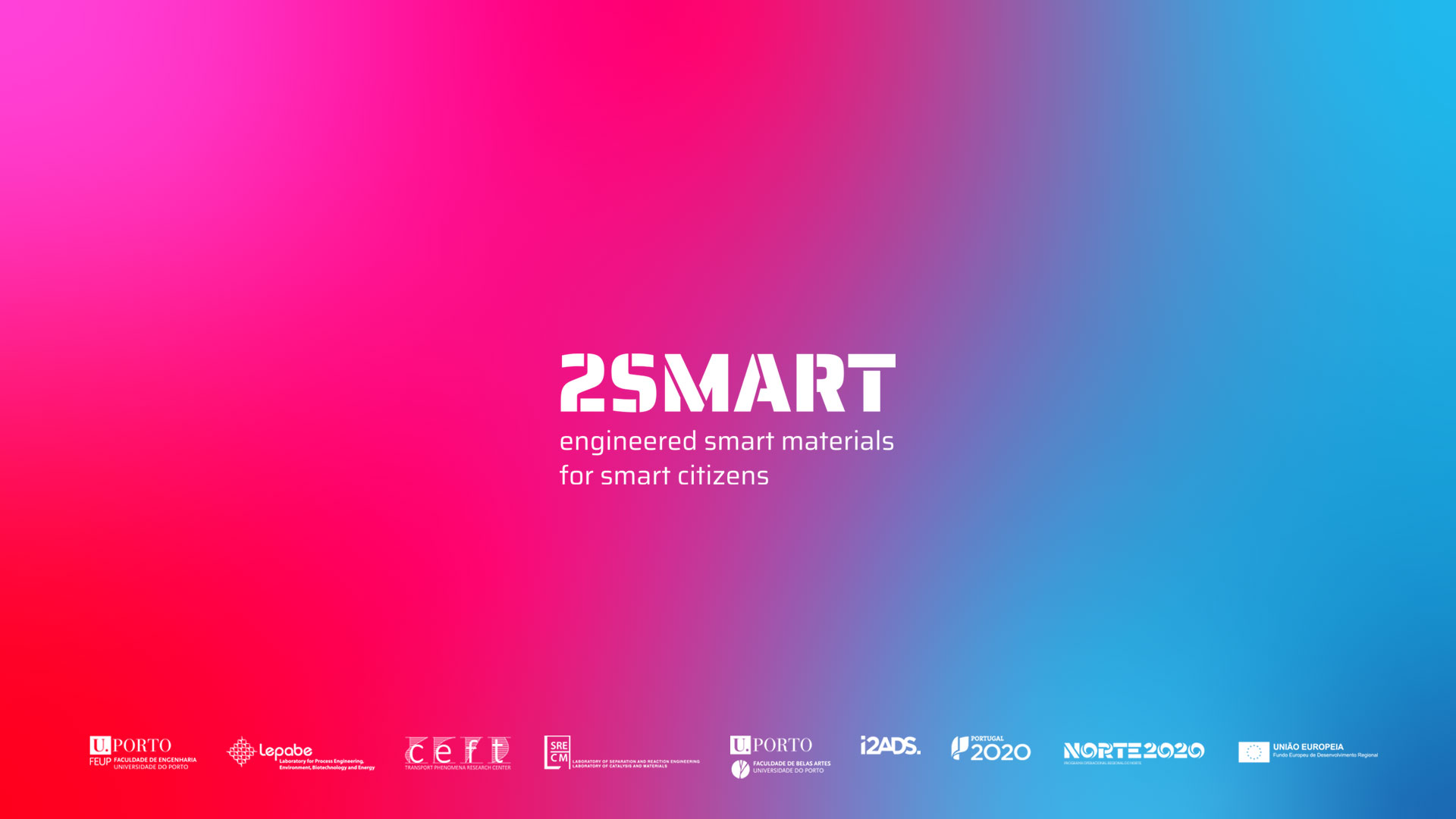2SMART
Engineered Smart materials for Smart citizens
Research project | NORTE2020
Computation, Hybrid Practices and Culture- Referência
- NORTE-01-0145-FEDER-55
- Financiamento
- € 588.180,07
- Financiamento i2ADS
- € 58.724,81
- Período
- 04.01.2021 — 06.30.2023
- Site do projeto
- https://www.up.pt/2smart/

The aim of the 2SMART – engineered Smart materials for Smart citizens project proposal is to develop smart solutions of engineering and design to improve quality of life and health of citizens.
2SMART fits in the – Climate-neutral and smart cities – mission of Horizon Europe, where the “cities and metropolitan areas”, as centers of economic activity, knowledge generation, innovation and new technologies, impact upon the quality of life of citizens who live and/or work in them and they are major contributors to global challenges.
It will profit from the complementary competences and (material and human) resources of the participating R&D units of the University of Porto (U.Porto), creating synergies from fundamental to applied research, where art and innovation combine. Together the 4 R&D units (LEPABE – Laboratory for Process Engineering, Environment, Biotechnology and Energy; LSRE-LCM, Laboratory of Separation and Reaction Engineering – Laboratory of Catalysis and Materials; CEFT – Transport Phenomena Research Center and i2ADS – Research Institute in Arts, Design and Society) will link their knowledge and resources to provide the Northern Region of Portugal with efficient solutions through the following activities:
Activity 1: Engineered smart materials for energy – it is intended to develop monolithic solar cells for efficiently harvesting indoor light irradiation to power the Internet of Things (IoT), electronic controls (e.g. TV and air-condition), and as an extension of the battery for tablets and mobile phones, among many other applications.
Activity 2: Engineered smart materials for protection of air quality – it is intended to develop a smart low-cost device to reduce children’s health risks from indoor air pollution exposure in schools, with scientifically calibrated and validated sensors, capable of interacting with the end-users and suggesting them the most adequate mitigation measures.
Activity 3: Engineered smart materials by digital manufacturing for environmental applications – it is intended to develop (photo)catalytic nanomaterials, as well absorbent materials through novel synthesis and modification methodologies, to be used in the manufacture of structured reactors using additive manufacturing (3D printing) to control and remove greenhouse gases and other contaminants in the cities.
Activity 4: Engineered smart materials for cancer diagnosis and therapy – it is intended the nanoencapsulation of anticancer drugs for new therapeutic approaches for brain cancer, the development of new platforms for cancer photoimmunotherapy based on nanographene formulations and near infrared radiation, and the use of nucleic acid mimics (NAMs) as a strategy for detection and treatment for bacteria associated with cancer.
Activity 5: Communicating science and technology with art and design – it is intended to link art and design-based activities to the previous targets, by: (1) developing artistic residencies that encourage the collaboration of scientific researchers and artists to spur the debate about the quality of life, the health of citizens and the inquiry on the effects of technology and science; 2) promote design research, focusing on the communication of science, so that the outcomes of the previous targets can be made accessible and more understandable to their target audiences.
The critical mass of this consortium of R&D units is an asset for the industry in Northern Portugal –owing to its intrinsic capacity to design, test and implement better processes and products. The present proposal is a step forward in the ultimate goal of enhancing resident human capital in strategic areas of interest to the Northern region and to reinforce R&D competencies by creating highly qualified jobs. Completely aligned in diverse RIS3 targets, it also fits the specific objectives of reinforcing the research, technological development and innovation, by aiming to increase the scientific production with internationally recognized quality.
- Institutions
Laboratory for Process Engineering, Environment, Biotechnology and Energy (LEPABE), FEUP (Coordenação)
Laboratory of Separation and Reaction Engineering – Laboratory of Catalysis and Materials (LSRE-LCM), FEUP
Transport Phenomena Research Centre (CEFT), FEUP
Instituto de Investigação em Arte, Design e Sociedade (i2ADS), FBAUP
Principal Investigator
Arminda Alves (LEPABE/FEUP)
Coordinator i2ADS
Miguel Carvalhais
Team i2ADS
Paulo Luís Almeida, Pedro Amado, Teresa Almeida
see all team members
Artists
André Rangel, Carolina Grilo Santos, Catarina BragaScholarship holders
Ana Duarte, Matilde Ferreira
Resultados do projeto 2SMART
Expositions
André Rangel (18.05-17.06.2022). (Des)aceleração. FEUP, Porto, Portugal.
Catarina Braga (01-10.03.2023). HMV_II. FEUP, Porto, Portugal.
Carolina Grilo Santos (16-31.03.2023). by Division and Differentiation. FEUP, Porto, Portugal.
Rangel, André, Catarina Braga and Carolina Grilo Santos (05.05-19.05.2023). Field Theory: Artistic Research in Light, Air and Matter. FBAUP, Porto, Portugal.
Edited book
Carvalhais, Miguel and Pedro Amado (Eds.). (2023). Field Theory: Artistic Research in Light, Air and Matter. i2ADS.